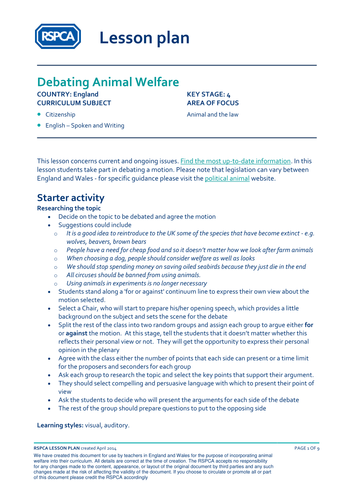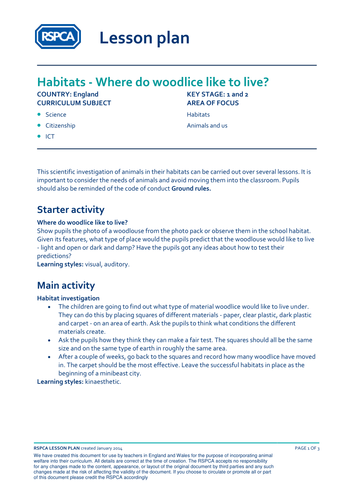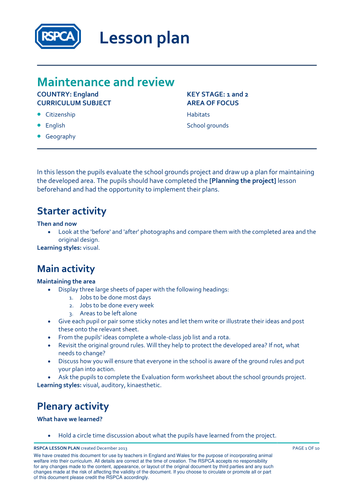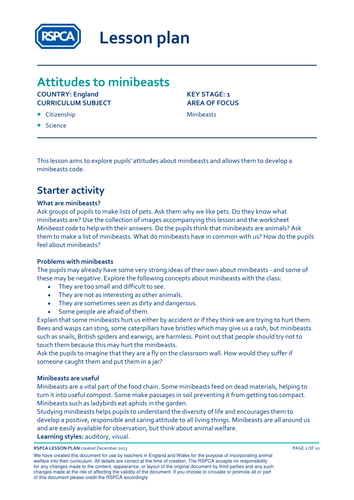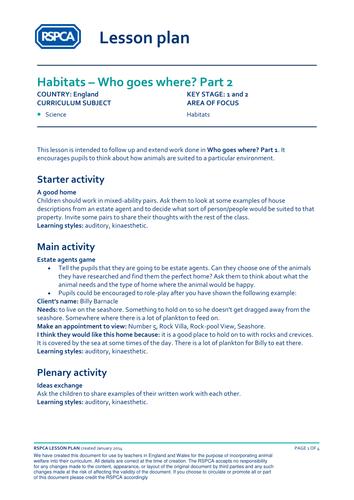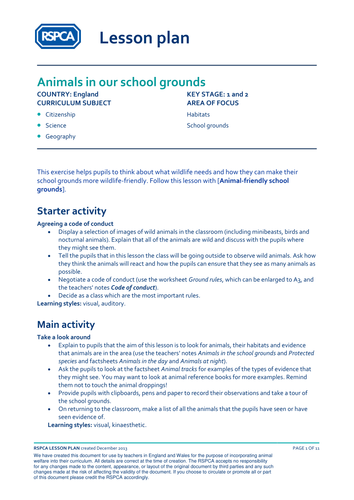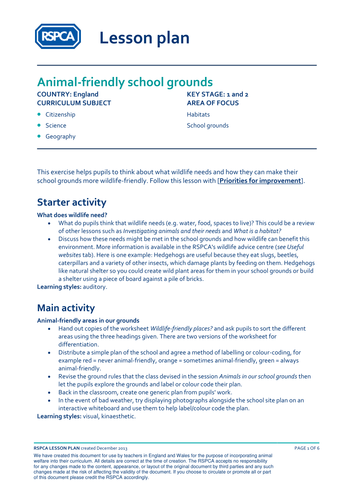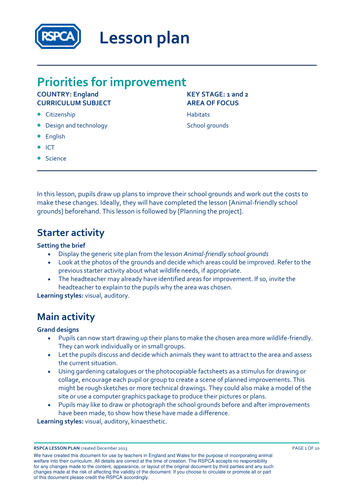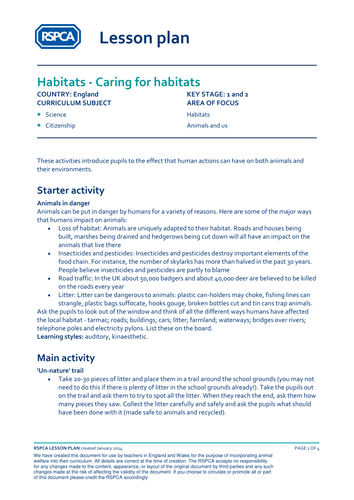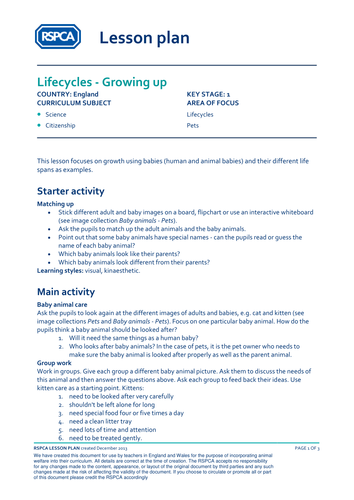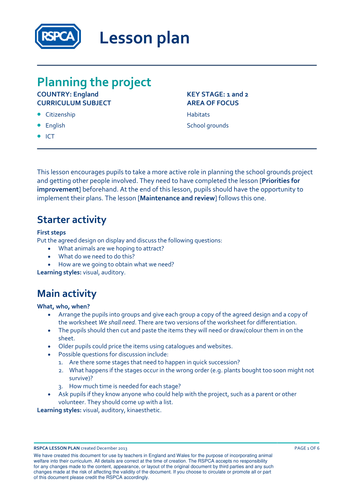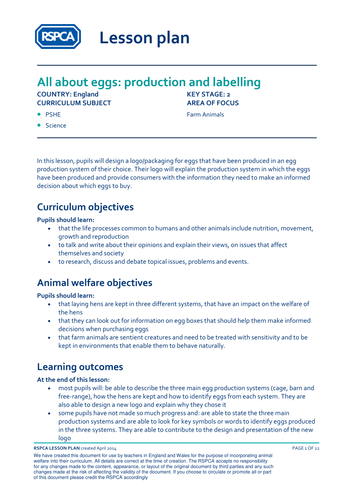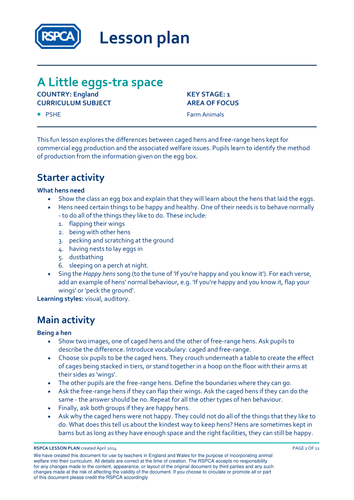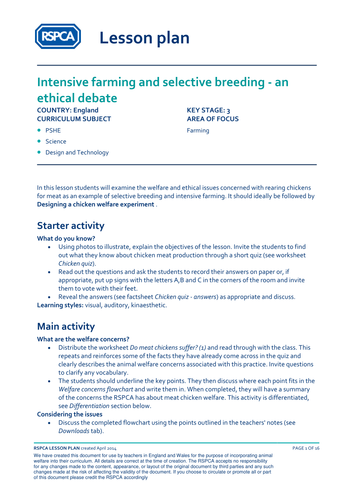60Uploads
58k+Views
52k+Downloads
Citizenship

Animals and the law - Debating Animal Welfare
In this lesson students take part in debating a motion. Please note that legislation can vary between England and Wales. Activities included.

Habitats - Where do woodlice like to live?
This scientific investigation of animals in their habitats can be carried out over several lessons. It is important to consider the needs of animals and avoid moving them into the classroom. Activities included.

School Grounds 5: Maintenance and review
In this lesson the pupils evaluate the school grounds project and draw up a plan for maintaining the developed area. The pupils should have completed the [Planning the project] lesson beforehand and had the opportunity to implement their plans.
Activities, teachers' notes and worksheets included.

RSPCA and Volkswagen Van Design Competition
This competition is designed to deliver a fun way of learning about all aspects of the RSPCA and applying that learning to design using art techniques while offering an opportunity for children to explain their design in an accompanying letter to be sent along with their entry. The competition closes in September so this could be a lesson plan for the end of the 2013/14 term or the beginning of the 2014/15 term

Minibeasts - Attitudes to minibeasts
This lesson aims to explore pupils' attitudes about minibeasts and allows them to develop a minibeasts code. Activities and worksheets included.
Pupils should learn: 1. that animals should be treated with care and sensitivity. 2. to appreciate that humans have a responsibility to ensure the well-being of all animals, including minibeasts.

Habitats - Who goes where?
These activities introduce pupils to the concept of gathering evidence on different animals' and plants&' habitats through investigation. Then encourages pupils to think about how animals are suited to a particular environment.

Habitats - Ground rules
Work with your class to develop a code of conduct before you study wild animals in their natural habitat. Activities included.

School Grounds 1: Animals in our school grounds
This exercise helps pupils to think about what wildlife needs and how they can make their school grounds more wildlife-friendly. Follow this lesson with [Animal-friendly school grounds].
Activities, teachers' notes and worksheets included.

School Grounds 2: Animal-friendly school grounds
This exercise helps pupils to think about what wildlife needs and how they can make their school grounds more wildlife-friendly. Follow this lesson with [Priorities for improvement].
Activities, teachers' notes and worksheets included.

School Grounds 3: Priorities for improvement
In this lesson, pupils draw up plans to improve their school grounds and work out the costs to make these changes. Ideally, they will have completed the lesson [Animal-friendly school grounds] beforehand. This lesson is followed by [Planning the project].
Activities, teachers' notes and worksheets included.

Habitats - Caring for habitats
These activities introduce pupils to the effect that human actions can have on both animals and their environments.

Lifecycles - Growing up
This lesson focuses on growth using babies (human and animal babies) and their different life spans as examples.
Activities included. Pupils should learn:
to make and communicate observations and comparisons of humans and other animals,
to match young and adults of the same animals
and to know that all animals should be treated with respect.

Habitats - What do birds prefer to eat?
This science investigation of animals in their habitats can be carried out over several lessons. It is important to consider the needs of animals and avoid moving them into the classroom. Activities included.

School Grounds 4: Planning the project
This lesson encourages pupils to take a more active role in planning the school grounds project and getting other people involved. They need to have completed the lesson [Priorities for improvement] beforehand. At the end of this lesson, pupils should have the opportunity to implement their plans. The lesson [Maintenance and review] follows this one.
Activities, teachers' notes and worksheets included.

Lesson Plan - Farm animals - All about eggs: production and labelling
Pupils will design packaging for eggs from different production methods.
In this lesson, pupils will design a logo/packaging for eggs that have been produced in an egg production system of their choice. Their logo will explain the production system in which the eggs have been produced and provide consumers with the information they need to make an informed decision about which eggs to buy.
COUNTRY: England
KEY STAGE: 2
SUBJECT: Science, PSHE, Farm animals
Included in this lesson plan:
Starter activies
Main activities
Plenary activities
Extension activities
Curriculum objectives
Learning outcomes
Vocabulary
Factsheet x5
Worksheets x3
Images

Lesson Plan - Farm animals: A little eggs-tra space
This fun lesson explores the differences between caged hens and free-range hens kept for commercial egg production and the associated welfare issues. Pupils learn to identify the method of production from the information given on the egg box.
COUNTRY: England
KEY STAGE: 1
SUBJECT: PSHE, Farm animals
Included in this lesson plan:
Starter activity
Main activity
Plenary activity
Curriculum objectives
Learning outcomes
Vocabulary
Worksheets x2
Factsheets x3
Teachers' notes

Lesson Plan - Farming - Intensive farming, selecting breeding - ethics
In this lesson students will examine the welfare and ethical issues concerned with rearing chickens for meat as an example of selective breeding and intensive farming. It should ideally be followed by Investigating suffering.
COUNTRY: England
KEY STAGE: 3
SUBJECT: Science, PSHE, Design and Technology, Farming
Included in this lesson plan:
Starter activies
Main activities
Plenary activities
Extension activities
Curriculum objectives
Learning outcomes
Vocabulary
Factsheet
Worksheets x3
Teachers' notes
Images

